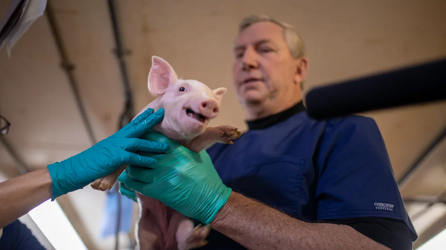
For the first time, surgeons have transplanted a kidney from a genetically modified pig into a living person, doctors in Boston said Thursday.
Richard Slayman, 62, of Weymouth, Mass., who is suffering from end-stage kidney disease, received the organ Saturday in a four-hour procedure, Massachusetts General Hospital announced. He is recovering well and is expected to be discharged soon, the hospital said.
"I saw it not only as a way to help me, but a way to provide hope for the thousands of people who need a transplant to survive," Slayman said in a statement released by the hospital.
The procedure is the latest development in a fast-moving race to create genetically modified pigs to provide kidneys, livers, hearts and other organs to help alleviate the shortage of organs for people who need transplants.
"Our hope is that this transplant approach will offer a lifeline to millions of patients worldwide who are suffering from kidney failure," said Dr. Tatsuo Kawai, the hospital's director for clinical transplant tolerance, in the hospital statement.
Animal organs could ease transplant shortage
Several biotech companies are racing to develop a supply of cloned pigs whose DNA has been genetically modified so they won't be rejected by the human body, spread pig viruses to people or cause other complications. NPR recently got exclusive access to a research farm breeding these animals for a company in this competition, Revivicor Inc. of Blacksburg, Va.The kidney transplanted in Boston came from a pig created by eGenesis of Cambridge, Mass. The eGenesis pigs are bred with 69 genetic modifications to prepare organs for human transplantation. The changes protect against a virus known to infect pigs as well as delete pig genes and add human genes to make the organs compatible with people.
"We are grateful for the courageous contribution of the patient and to the advancement of transplantation science," said Mike Curtis, chief executive officer for eGenesis in the statement. "This represents a new frontier in medicine and demonstrates the potential of genome engineering to change the live of millions of patients."
The field is stirring excitement about harnessing cloning and gene-editing technologies to solve the persistent shortage of organs for human transplantation. More than 103,000 people are currently on the waiting list for organs. About 17 die every day because they can't get one.
End-stage renal disease is 3.8 times more common among Black people than white people in the U.S., according to federal statistics.
The transplant "represents a potential breakthrough in solving one of the more intractable problems in our field, that being unequal access for ethnic minority patients to the opportunity for kidney transplants due to the extreme donor organ shortage and other system-based barriers," said Dr. Winfred Williams, the kidney specialist treating Slayman, who is a Black man.
Reservations about using animal organs in people
But the research is also raising several concerns. One worry is about the possibility of spreading animal viruses to humans. Another is about slaughtering thousands of animals every year to harvest their organs. Some also question testing these organs on gravely ill patients."I think we need to be very, very careful," L. Syd M. Johnson, a bioethicist at SUNY Upstate Medical University in Syracuse, N.Y., told NPR. "I have a lot of concerns about a therapy that is very much unproven."
Surgeons have already transplanted kidneys and livers from genetically modified cloned pigs into baboons and a handful of brain dead people. Surgeons at the University of Maryland even tested hearts in two men who had run out of other options. They lived for several weeks after the procedures.
Slayman got a human kidney transplant after being on dialysis for seven years, according to the hospital. But his transplanted kidney showed signs of failure after about five years, forcing Slayman to resume dialysis last May. He's since been suffering serious complications.
The transplant of the pig kidney was made possible by the Food and Drug Administration as part of a "compassionate use" program aimed at helping desperate patients.
"When my transplanted kidney began failing in 2023, I again trusted my care team at MGH to meet my goals of not just improving my quality of life but extending it," Slayman said in the hospital's statement, adding the doctors explained the "pros and cons of this procedure."
https://www.npr.org/sections/health-shots/2024/03/21/1239790816/first-pig-kidney-human-transplant (Archive)
 No child you will not take my kidneys. This is simply not going to happen. Enjoy Prison.
No child you will not take my kidneys. This is simply not going to happen. Enjoy Prison.